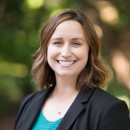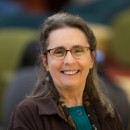Research Office News
Pages
 Lisa Wexler’s Research NIH News in Health Cover Story
Lisa Wexler’s Research NIH News in Health Cover StoryProfessor Lisa Wexler’s research is featured in an article on resilience, which is the April 2022 cover story of NIH News in Health. Wexler discusses how tapping into protective factors — including cultural traditions such as ceremonies, teachings and practices — can help build resilience.
- April 6, 2022
- Learn more »
 Katie Maguire-Jack’s New Book Explores the Impact of Community on Child Maltreatment
Katie Maguire-Jack’s New Book Explores the Impact of Community on Child MaltreatmentAssociate Professor Katie Maguire-Jack is editor of “Neighborhoods, Communities, and Child Maltreatment: A Global Perspective,” which explores a diverse range of research relating to the impact of communities on child maltreatment and parenting.
“‘Neighborhoods, Communities, and Child Maltreatment’ includes perspectives from around the globe on the critical role that communities play in families' lives,” said Maguire-Jack. “It delves into the meaning and impact of neighborhoods across different contexts, introduces innovative community-level maltreatment prevention strategies, and highlights advanced methodological approaches for studying these issues. It is my hope that this book will advance research and policy for effective child maltreatment prevention with an understanding of the importance of communities."
- April 6, 2022
- Learn more »
 Shanna Kattari is a 2022 Vicki Sexual Freedom Award Honoree
Shanna Kattari is a 2022 Vicki Sexual Freedom Award HonoreeAssistant Professor Shanna Kattari is a Woodhull Freedom Foundation 2022 Vicki Sexual Freedom Award Honoree. The award recognizes those individuals whose life and work embody the foundation’s mission and values, and who have made landmark contributions to the sexual freedom movement through education, advocacy, research and activism.
Kattari will receive the award in August 2022 at the Sexual Freedom Summit. “As someone who has been doing sexuality education and advocacy work for the better part of two decades, I am so honored that my work is being recognized in this way,” said Kattari. “We still have far to go to ensure that all disabled people, queer and trans people, people of color, older adults, kinky folks, those who are non-monogamous and sex workers are treated with justice in the realm of sexuality, basic human rights and access. I hope my work brings more attention to many of these topics, and encourages social workers to understand that affirming sexuality is an important part of our practice.”
- April 6, 2022
- Learn more »

 Children’s Savings Accounts Offer Hope
Children’s Savings Accounts Offer HopeAssociate Professor Terri Friedline and Professor William Elliott spoke with the Guardian about the benefits of children’s savings accounts, which extend beyond saving money for college. Research shows that these accounts positively affect the social emotional development of kids and encourages families to build other assets. “It’s not because they’re getting money in their hands, it’s more about understanding their kids have a better future,” said Elliott. “What assets give you is tangible hope.”
- April 5, 2022
- Learn more »
 Terri Friedline Shares Overdraft Fees Research with U.S. House Committee on Financial Services
Terri Friedline Shares Overdraft Fees Research with U.S. House Committee on Financial ServicesAssociate Professor Terri Friedline was invited to share her research on overdraft fees with the U.S. House Committee on Financial Services. Friedline is part of a nationwide movement to eliminate overdraft fees which are excessive, predatory, and punish lower-income people for not having enough money in the bank.
- March 30, 2022
- Learn more »
 Ashley Cureton Named 2022 U-M Center for Academic Innovation Engagement Faculty Fellow
Ashley Cureton Named 2022 U-M Center for Academic Innovation Engagement Faculty FellowAssistant Professor Ashley Cureton has been named a 2022 Public Engagement Faculty Fellow by the U-M Center for Academic Innovation. The cohort of 14 fellows will participate in an intensive program designed to build engagement skills, understand key public-engagement concepts and reflect together on how public engagement fits into their scholarly identities.
"This program will help me to reflect on how public engagement fits into my scholarly identity. I am committed to considering the breadth of ways that my research creates public impact, from designing exhibits to working with policymakers to conducting community-engaged research projects to develop interventions and programs and to amplify the voices of refugee populations in the U.S. and abroad," said Cureton.
- March 23, 2022
- Learn more »

 2022 ENGAGE Active Grant Recipients: Empowering Engagement with Detroit Communities
2022 ENGAGE Active Grant Recipients: Empowering Engagement with Detroit CommunitiesYouth Engagement through Cannabis Prevention and Employment Training
Faculty Member: Associate Professor Cristina Bares
Community Partner: Kartav Patel, Manager of Youth Services, Southwest Economic Services
Welcome to the Motor City: Exploring Refugee Resettlement Among Afghan Refugees and Beyond
Faculty Member: Assistant Professor Ashley Cureton
Community Partner: Shadin Adityeh, Director of Employment and Economic Empowerment Programs, Jewish Family Services of Washtenaw County and Detroit
Tuxedo Project Community Map
Faculty Member: Lecturer Maureen Okasinski
Community Partner: Rose Gorman, Executive Director, The Tuxedo Project
Enacting Action Goals Informed by HOMES Survey: Services and Options for LGBTQ+ Older Adults in Metro Detroit
Faculty Member: Associate Professor Beth Glover Reed
Partner: Angela Gabridge, Executive Director, Sage Metro Detroit
- March 11, 2022
 Linda Chatters Coeditor of Book on Aging Black Americans
Linda Chatters Coeditor of Book on Aging Black AmericansLinda Chatters co-edited Volume 41 of the Annual Review of Gerontology and Geriatrics: Black Older Adults in the Era of Black Lives Matter. Katrina Ellis, James Ellis, and Robert Joseph Taylor contributed book chapters. The book represents an important moment in the development and maturation of research and scholarship on Black older adults that builds on the many contributions of prior generations of eminent African American gerontologists.
- February 1, 2022
 Rita Hu Named a 2021 Elizabeth Douvan Junior Scholar
Rita Hu Named a 2021 Elizabeth Douvan Junior ScholarPhD student Rita Hu has received the 2021 Elizabeth Douvan Junior Scholar in Life Course Development, part of the Institute for Social Research (ISR) Next Generation Awards.
Named in honor of Elizabeth “Libby” Douvan, the first female member of ISR’s research facility, the fund is designed to support senior graduate students, post-doctoral candidates, and junior faculty members with research agendas in Life Course Development (LCD). Scholars at this point in their careers are often at their most creative and productive and Douvan is fondly remembered for her skill and caring in assisting researchers through this stage.
“As a mentee of Dr. Toni Antonucci, the Elizabeth M. Douvan Collegiate Professor of Psychology, and a member of the LCD program, it is my honor to pass on the legacy,” says Hu. “My research interests in social relations across the lifespan were inspired by research done by LCD members and the supportive learning environment at LCD. The fund will support me in learning and exchanging ideas with scholars at conferences, as well as advancing my knowledge in research methods to further understand social relations and ageism.”
- January 19, 2022
- Learn more »
 Rogério Meireles Pinto Appointed the Berit Ingersoll-Dayton Collegiate Professor of Social Work
Rogério Meireles Pinto Appointed the Berit Ingersoll-Dayton Collegiate Professor of Social WorkAssociate Dean for Research and Innovation and Professor of Social Work Rogério Meireles Pinto has been appointed the Berit Ingersoll-Dayton Collegiate Professor of Social Work. Pinto’s community-based participatory research aims to improve access to social work and public health services, particularly those services at the intersection of health and well-being. He examines how transdisciplinary collaboration and practitioners’ involvement in research improves the delivery of evidence-based services. He also studies factors that influence ethnic and sexual minority women’s involvement in research and health care.
- January 18, 2022